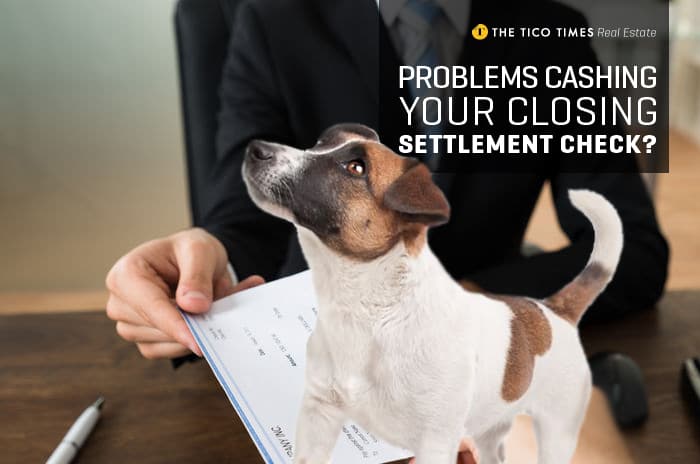I recently received a phone call from a person with a serious problem: He had just sold his beachfront property in Costa Rica and received his closing settlement check in the name of the property owner, which was a corporation. But he didn’t have a bank account in the corporation’s name and couldn’t deposit the check in his personal account.
I generally steer clear of legal issues in real estate; I prefer to leave that to legal advisors. But I feel this is an issue worth writing about, because it happens with some frequency, and the legal advisors I have met generally don’t know how to help.
Let me explain
Here’s the background. This property owner, whom I’ll call Alex, purchases a vacation home in a beautiful beach area of Costa Rica. His lawyer constitutes a corporation called Whynotme Sociedad Anónima and makes Alex and his wife, Linda, the owners and shareholders of the corporation. At closing, it’s Whynotme S.A. that becomes the legal owner of the property. Alex and Linda have the powers of attorney for the corporation.
Fast-forward 12 years. Alex and Linda are now retired, and they decide to sell their property. Of course they first started out listing it way too high, which is quite normal in our market. For that reason, they go through quite a few real estate agents who get tired of trying to sell the house and it takes them quite a while to do so.
Finally, one day, Alex gets an offer that they decide to accept. The “agent” is a surfer dude and not a real estate professional, but Alex doesn’t care as long as the house sells. The buyer’s attorney sends the draft of the purchase-sale agreement to the agent for review. The seller doesn’t bother to get his own lawyer to check the draft.
At closing, 60 days later, all the documents are ready to sign. The buyer and seller sign the transfer of the title. The property is transferred from Whynotme Sociedad Anónima to the buyer’s corporation. The seller receives his check in the name of Whynotme Sociedad Anónima.
The closing settlement check
“Wait a minute!” says Alex. “My closing settlement check is in the name of Whynotme Sociedad Anónima? I want the check in my own name. What the heck am I going to do with a check in the name of my corporation?”
The lawyer’s answer is that Whynotme S.A. is the entity selling the house, not Alex, so payment is issued to Whynotme S.A. “I’m sorry, there’s nothing I can do for you here,” says the lawyer. “The closing documents are all signed, and the closing settlement check is in the corporation’s name, as it should be.”
Why a corporation?
For many years, it was common practice to purchase a property in the name of a corporation, or sociedad anónima. Lawyers in Costa Rica explained to real estate buyers that for liability reasons, it was more secure to purchase a property through a corporation.
But receiving a closing settlement check in your corporation’s name, if you don’t have a bank account in that corporation’s name, constitutes a huge problem. Many years ago, you were able to just endorse the check and then deposit it into your personal bank account. This is not allowed anymore. Now you have a check in a corporation’s name and your bank won’t accept it. So what is the solution?
The solution
1. Request, at closing, an authenticated copy of your purchase-sale agreement so you can use that in case a lower sales amount is used in the deed.
2. Request, at closing, an authenticated copy of the deed.
3. Get a certified power of attorney that shows you as the legal representative of the corporation. You can purchase those online from the National Registry for only ¢2,800.
4. Make a photocopy of your passport, Dimex card, cédula or the legal identification that was used in the closing documents.
5. Go to the teller at the bank and ask the teller to cash the closing settlement check (yes, in cash, no matter how much money it is, the higher the amount the better) and show all the closing documents that you have.
6. The teller will ask his/her boss what to do, and they will likely tell you that they don’t have that much cash on hand.
7. Then tell them to please give you a cashier’s check in your name instead. Ask them to deduct the cost of the cashier’s check, which is $35.
This solution has worked well at various banks in Costa Rica.
Other solutions
1. Request to wire the money to your local or foreign bank account and be prepared to pay for the wire cost.
2. Request an international cashier’s check that you can take anywhere in the world and deposit in person.
As a last recommendation, always try to hire a savvy real estate agent and an experienced real estate attorney who will be concerned about more than just getting their own paycheck.
Ivo Henfling founded the American-European Real Estate Group in 1999 — the first functioning MLS in Costa Rica with affiliate agents from coast to coast. Contact Ivo at (506) 2289-5125 / 8834-4515 or at ivo@american-european.net.






